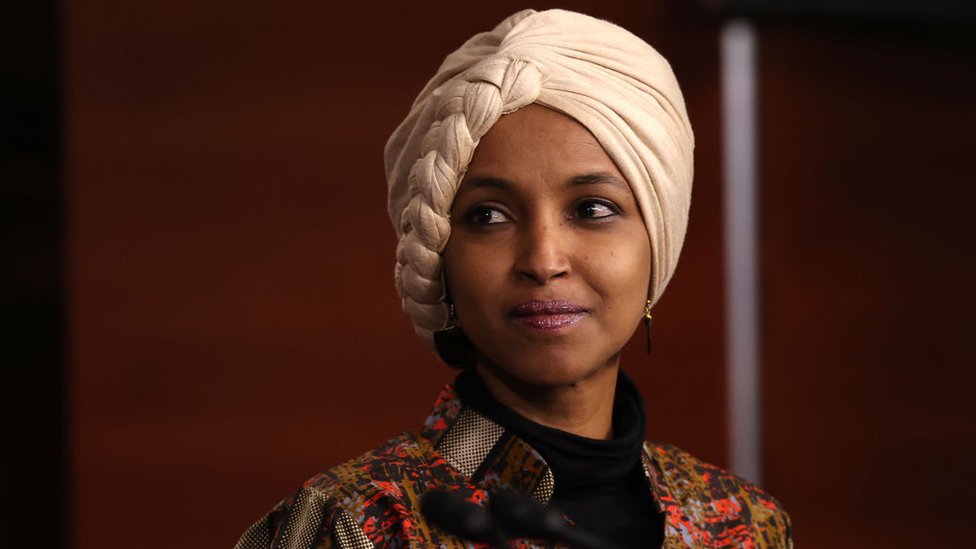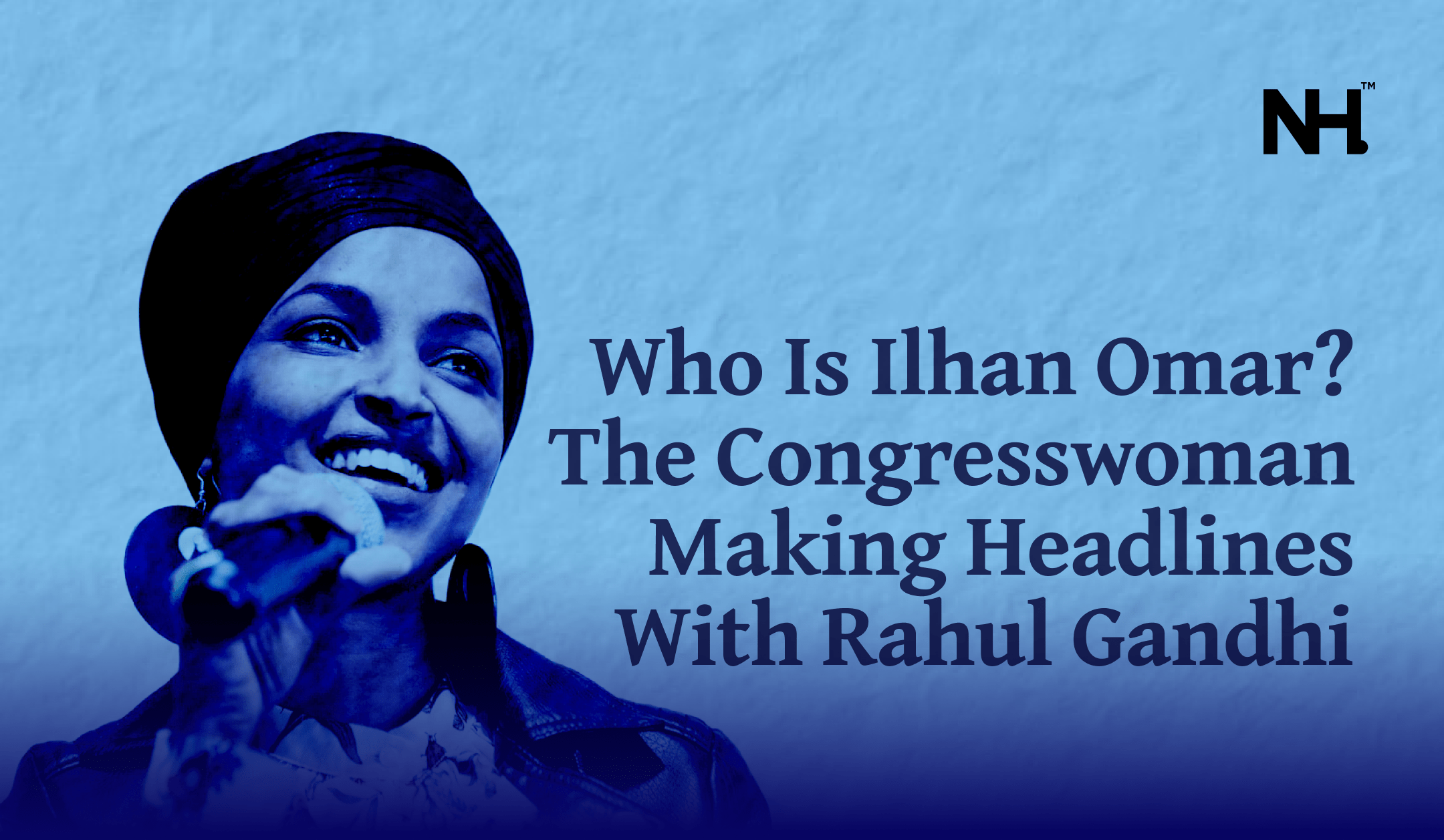In a recent development that captured global attention, Congresswoman Ilhan Omar met with Rahul Gandhi, leader of the opposition in India’s Lok Sabha, during his visit to Washington. Along with other prominent lawmakers from the Biden administration, such as Ro Khanna and Raja Krishnamoorthi, Omar’s presence raised eyebrows back in India. Known for her outspoken views on South Asian geopolitics and her criticism of India’s stance on several issues, Omar’s inclusion in this meeting underscores the complexity of international relations between the world’s largest democracies.
/newsdrum-in/media/media_files/17XQkkfRAF88xw8vBCNi.jpg)
Ilhan Omar (on the extreme right) with Rahul Gandhi (extreme left), in Washington
But who is Ilhan Omar? And why does her political career continue to provoke such strong reactions, both in the U.S. and globally?
Born in Mogadishu, Somalia, on October 4, 1982, Omar’s early life was marked by the violence of the Somali Civil War. Fleeing with her family, she spent four years in a Kenyan refugee camp before seeking asylum in the United States. In 1995, Omar and her family arrived in New York, eventually settling in Minneapolis. Raised by her father and grandfather, she was introduced to politics at a young age, interpreting caucus meetings for her grandfather.
Omar became a U.S. citizen in 2000 at the age of 17. She would later graduate from North Dakota State University with degrees in political science and international studies, before embarking on a career dedicated to public service and political advocacy.
Her rise to political prominence began in 2016 when she became the first Somali American legislator in the United States, elected to the Minnesota House of Representatives. But her victory in 2018, when she became one of the first two Muslim women to serve in the U.S. Congress (alongside Rashida Tlaib), catapulted her onto the national stage.
Ilhan Omar ran for the U.S. House from Minnesota’s 5th district in 2018 after incumbent Keith Ellison announced he would not seek reelection. Endorsed by the Minnesota Democratic–Farmer–Labor Party, she won the primary with 48.2% of the vote and defeated conservative Jennifer Zielinski in the general election with 78.0%, becoming the first Somali American and first woman of color from Minnesota elected to Congress.
In 2020, Omar secured the Democratic nomination again, winning the primary with 57.4% against well-funded opponent Antone Melton-Meaux. She won the general election with 64.3% of the vote, though her margin was lower than Biden’s in the district.
In 2022, Omar narrowly won the Democratic primary against Don Samuels with 50.3% of the vote. She is currently seeking reelection for a fourth term, having won the August 2024 primary with 56%.
Omar’s tenure has included significant legislative actions, such as introducing a resolution supporting the right to boycott for civil rights. Following the January 6 Capitol attack, she described the traumatic experience and expressed concerns for her safety. Omar serves on the Committee on Education and the Workforce and the Committee on the Budget in the 118th Congress.

A Voice for Progressive Change
Omar’s political platform is unapologetically progressive. As a deputy chair of the Congressional Progressive Caucus, she has championed policies like the $15 minimum wage, student loan debt forgiveness, and universal healthcare. Her advocacy extends to immigration, where she has pushed for the abolition of the U.S. Immigration and Customs Enforcement (ICE), and to foreign policy, where she is a staunch critic of U.S. military aid to Israel.
Her views on Israel, however, have sparked significant controversy. Omar has repeatedly voiced support for the Boycott, Divestment, and Sanctions (BDS) movement, which seeks to pressure Israel over its treatment of Palestinians. In 2023, these comments led to her ousting from the House Foreign Affairs Committee by the Republican-controlled House, with accusations that her past remarks, including a 2019 tweet that suggested political support for Israel was financially motivated, were antisemitic.
Controversy Beyond Borders: South Asia and Kashmir
Ilhan Omar’s outspoken stance on South Asia has also drawn considerable attention. Her 2022 visit to Pakistan and subsequent trip to Pakistan-occupied Kashmir (PoK) triggered diplomatic tension with India. The Indian government condemned her visit as “narrow-minded politics,” and media reports indicated that the Pakistani government had sponsored her stay.
Omar’s commentary on the India-Canada diplomatic row further fueled the fire. Recently, she urged the U.S. to fully support the Canadian investigation into India’s alleged involvement in the assassination of Sikh separatist leader Hardeep Singh Nijjar. “We are also requesting a briefing on whether there are similar operations in the United States,” Omar wrote in a post on X (formerly Twitter). This sentiment earned her criticism from Indian officials and commentators, with Shiv Sena MP Priyanka Chaturvedi notably lambasting Omar for “interfering in the peace of Jammu & Kashmir.”
Her position on Kashmir aligns with her broader critique of India’s handling of its Muslim-majority regions. The BJP and its affiliates have not been shy in labelling Omar as a “radical Islamist” and a “Pakistan-sponsored anti-India voice,” accusations recently echoed by BJP spokesperson Amit Malviya after Rahul Gandhi’s meeting with Omar in Washington.
Navigating Criticism and Death Threats
Despite her advocacy for marginalized communities, Omar has faced relentless personal attacks throughout her political career. Her critics have included former U.S. President Donald Trump, who infamously urged her to “go back” to the countries from which she came. Omar, who has been the target of numerous death threats, has often linked these attacks to racism, Islamophobia, and xenophobia.
However, she has remained resolute in her mission to bring change. In her words, the backlash is emblematic of a system threatened by her very existence. Despite her adversaries, Omar continues to be an emblem of progressive values, representing not just the people of her district in Minneapolis, but also serving as a voice for refugees, immigrants, and minorities across the U.S.
The Rahul Gandhi Meeting: A Diplomatic Flashpoint?
The meeting between Ilhan Omar and Rahul Gandhi, set against the backdrop of the U.S.-India relationship, has inevitably sparked debate. For the BJP, Gandhi’s association with Omar is seen as a betrayal of national interests, given her critical stance on India. For the Congress Party, however, it is a diplomatic engagement with a key figure in the U.S. political landscape.



















































































